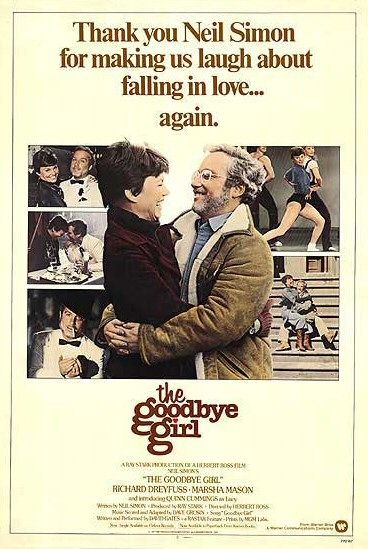After I watched San Francisco, I decided to watch yet another film that I had DVRed during TCM’s 31 Days of Oscar. I had several films to choose from and I ultimately decided to watch the 1977 best picture nominee The Goodbye Girl because, in general, I like movies from the 70s. Add to that, the film was described as being a comedy and who am I to turn down the chance to laugh?
The Goodbye Girl asks the question, “What would happen if two of the most annoying people on Earth were forced to live together and then ended up falling in love with each other as a result?” Paula (Marsha Mason) is recently divorced and is trying to raise her 10 year-old daughter, Lucy (Quinn Cumming), while also trying to relaunch the dance career that she put on hold when she got married. As played by Marsha Mason, Paula is probably one of the most humorless characters to ever be at the center of a romantic comedy. It’s not just that Paula is written to be a very angry character. (For the most part, Paula has every right to be angry). Instead, it’s that Mason gives such a totally sour performance that you get the feeling that Paula has probably never smiled once over the course of her entire life. When, later on in the film, she does smile, it feels forced and unnatural. You worry that her face is going to split in half.
In the course of one very bad week, she is abandoned by her actor boyfriend (he’s going to Italy to shoot a film) and she discovers that, before he left, her ex also sublet their apartment to another actor. That actor is Elliott Garfield (Richard Dreyfuss), who is hyperactive, immature, self-centered, and very, very talkative. He does things like play guitar in the nude and meditate in the morning.
Once Elliott shows up and barges his way into the apartment, a familiar pattern is established. Elliott does something eccentric. Paula yells at him. Elliott yells back. Paula yells in reply. Elliott yells some more. Even if you never quite buy the idea that the two of them would ever fall in love, you’re glad when they do because at least it gives them something to do other than yell.
(Of course, The Goodbye Girl was written by Neil Simon, which means that not only are Elliott and Paula yellers but they’re also very quippy yellers. And while I guess we should be happy that Elliott tells the occasional joke, the constant barrage one liners is ultimately rather alienating. Every time you think that the film is about to make an interesting point about human relationships, Elliott says something quippy and ruins the mood.)
Which is not to say that The Goodbye Girl is a terrible movie. The scenes where Elliott rehearses and then appears in a terrible production of Richard III are brilliantly done and wonderfully satirize theatrical pretension. As well, during its second hour, the film settles down a little bit. Or, I should say, Richard Dreyfuss settles down and actually starts to give a performance that’s more than just a collection of nervous tics. It helps that once Elliott and Paula are in love, they don’t yell at each other quite as much. There’s even a rooftop dinner scene where the two actors finally show a hint of chemistry.
Ultimately, The Goodbye Girl is an uneven film that feels a lot like a sitcom. It’s one of those films that you watch and, even though it’s not terrible, you still find yourself thinking, “This was nominated for best picture?”
